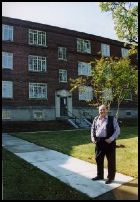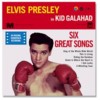Elvis
left the building, but you can sleep in his bedroom
March
6, 2005 BY DAVE HOEKSTRA Staff Reporter Memphis, Tennessee
|
The
smallest details can shape the biggest dreams. In 1949,
Vernon Presley moved his wife and teenage son Elvis
into Apartment 328 at Lauderdale Courts, 185 Winchester,
in downtown Memphis. The modestly appointed two-bedroom
unit consisted of a living room, bathroom and walk-in
kitchen.
A
public housing development built in 1938 under President
Franklin Roosevelt's WPA, Lauderdale Courts was one
of the first U.S. public housing projects. The projects
were slated to be razed in the mid-1990s, but Presley
fans, along with the City of Memphis and private developers,
saved the courts. The 66 red brick buildings of the
22-acre site are on the National Register of Historic
Places.
|
 |
And
now you can sleep in Elvis' teenage bedroom. Presley lived
here between 1949 and 1953, when he was attending Humes High
School -- key years in his cultural development. He could
walk to Beale Street to absorb black rhythm and blues. He
attended gospel concerts two blocks away at the since-razed
Ellis Auditorium. He saw possibilities. IF YOU GO Up to four
guests can stay in Apartment 328 for a two-night minimum or
six-night maximum at $249.99 per night.
Reservations
are not being accepted during Elvis Week (Aug. 10-17), when
the apartment will be open for public tours. For reservations
and information, contact Lauderdale Courts at Uptown Square,
(901) 521-8219, or visit www.lauderdalecourts.com. But this
is no Heartbreak Hotel. The beautiful 689-square foot apartment
was recently opened for public tours and reservations are
being accepted for dates beyond April.
This
is the only place on earth where you can live where Presley
lived. Last month I became one of the first to stay in Apartment
328, and the sensory overload surpassed the night I slept
between Duane and Gregg Allman's former bedrooms in the Allman
Brothers' "Big House" in Macon, Ga. I could only imagine the
dreams that Presley must have had in this bedroom.
The
courts are part of the Uptown Square development that is bringing
life back into downtown Memphis. Uptown Square is a division
of the $150 million Uptown Memphis Movement, which includes
the building of more than 1,000 new homes and apartments along
with new streetscapes. Uptown Square restored the Presley
apartment with depth, dignity and lots of period detail.
The real kicks come in Elvis' bedroom. A replica 1953 Herald
high school yearbook (the King majored in shop and history)
rests on the dresser, alongside a jar of Royal Crown Hair
Dressing, popular with blacks on Beale Street. (The research
team knew Royal Crown was the real deal because Vernon saved
all his receipts.) The Elvis bedroom also is adorned with
photos of Rudolph Valentino and Tony Curtis.
When
Presley was 15, he was an usher at Loew's State Theater on
South Main Street in downtown Memphis. In his critically acclaimed
biography Last Train to Memphis: The Rise of Elvis Presley,
Peter Guralnick writes that the Lauderdale era played a key
role in shaping Presley's style.
"The
whole feel of Lauderdale Courts was upward mobility," Guralnick
said from Nashville, where he is teaching creative writing
at Vanderbilt University.
"It
was expressed in their motto ["From slums to public housing
to private ownership"]. People think of Elvis as a deprived
child on welfare, but this really is not the picture. He was
surrounded by people on the way up. The courts helped mold
his democratic ideals." Ken Black, 71, brother of the late
Bill Black, Presley's bass player, reminisced about when his
widowed mother Ruby and his eight siblings lived at Lauderdale
Courts. (Bill Black was grown and did not live at the courts,
but would come to visit.) Ken Black is a member of a group
of former Lauderdale Courts residents called "Poor Boys Done
Good," who meet every Thursday for coffee at a Perkins Restaurant
in east Memphis.
They
agree their time at Lauderdale provided for some of the best
memories of their life. "I met Elvis in 1949 at Humes High
School," Black said while sitting in the Presley living room.
"He was in the ninth grade, I was in the 10th. I lived at
the other end of the complex. When Elvis moved out, he went
to Alabama Street [about a half-mile from Lauderdale]. I lived
across the street and got to know him real well."
The
"Poor Boys Done Good" provided rich background for the restoration.
"They all had their own stories about, 'You should use this
wax or that wax, or this wood was better,'" recalled Alex
Mobley, asset manager of the Uptown Memphis Movement. Communal
life in the courts included monthly inspections by the Memphis
Housing Authority staff. "Elvis got written up for leaving
a cereal bowl on the table," Mobley said.
"He
was late for school. There was a report like, 'Needs help
in cleaning up.' Then they would come back and give you a
cleaning lesson." Presley used to listen to records at the
Popular Tunes record store, 311 Exchange Ave., which still
stands within walking distance of Apartment 328.
"He
hung around there some, and there was another record shop
real close that was like a teenage hangout from the Bowery
Boys," Black said. "I don't even know if it had a name. It
is no longer in existence." Black walked through the apartment
with a reflective eye. He saw the trunk at the foot of Elvis'
bed, smiled and said, "My mother had a trunk just like that
at the foot of her bed."
A
retired sign painter, Black pointed out that even the 16-inch
deep windowsills were the same as when he lived in the courts.
At night, Presley would sit his bedroom windowsill and play
guitar. He also practiced in the basement laundry room. Throughout
nine months of research, what was Mobley's biggest Elvis surprise?
"It was seeing photos of him when he was here," she said.
"He already had the greased hair, color and black satin pants
-- with his friends standing next to him in jeans and a shirt.
He already looked different than every other boy. Everyone
in the courts knew who he was."
Lauderdale
Courts bottomed out in the mid-1990s when only 75 of 499 apartments
were occupied. The revitalized Uptown Square neighborhood
still stands at a crossroads of fortune, with the complex
bordered on the north by St. Jude Research Hospital and operations
like Angel Bail Bond on the south. The courts have been transformed
into 347 new apartments, currently 85 percent leased. Eighty
percent of residents pay the market rate, while 20 percent
are fixed-income public housing dwellers. Amenities include
an outdoor pool, billiard room and fitness and media centers.
No
one famous has yet to stay in Apartment 328, although a few
weeks ago, Bob Dylan dropped into Sun Studios. Dylan told
the studio help he just wanted to "Kiss the X" and bent down
and smooched the X on the floor where so many of his musical
heroes stood years ago. Dylan will have to add Apartment 328
to his list. Like any visitor to the old courts, he will love
it tender. Public housing fit for the King The team assigned
to restore Lauderdale Courts had to balance modern amenities
with a vivid early 1950s touch.
"When
you walk in here, there's nothing that shocks you out of the
time period," explained researcher Alex Mobley, a native of
Wagga, Wagga, Australia, who was given access to material
from Elvis Presley Enterprises and the Memphis Housing Authority.
"You don't see a microwave and say, 'That's all wrong.'"
Presley's
mother, Gladys, was the headliner in the kitchen, which features
a working 1951 Frigidaire with silver ice cube trays, complete
with the stick-shift handle. The kitchen's tiny stove was
actually issued by the Memphis Housing Authority. The kitchen
is accented with vintage Stanley Products (the Tupperware
of the early 1950s). As the only son, Elvis was given his
own set of dishes and silverware.
A
vintage RCA Victor floor radio anchors the living room, which
features restored parquet floors made by the same manufacturer
who did the original parquet floors at Lauderdale Courts.
A moon-shaped shelf holds the type of figurines that Gladys
would have collected. The Presley apartment was designed by
Amy Carkuff of Carkuff Interior Design in Memphis. But the
apartment isn't all retro.
An
antique living room cabinet contains a plasma-screen TV with
cable and a DVD/CD player. After I checked in I turned on
the TV only to find "The Osbournes." Sitting in the Presleys'
apartment while watching Ozzy Osbourne makes for a surreal
experience. In Elvis' bedroom, a 40-inch long and 22-inch
deep replica wooden trunk in Presley's bedroom represents
just about everything the Presleys had when they packed up
and moved from Tupelo, Miss., to Memphis.
Before
settling in Lauderdale Courts, the Presleys lived briefly
in two Memphis boarding houses. The Presleys paid $35 a month
at the courts.
"This
was a big step up for them," said Uptown Courts property marketing
director Anna Henning. Henning walked around the house and
led me into the bathroom. "Ohhhh!," she said and picked up
what appeared to be a thin plunger from the black-and-white
tile floor.
"Do
you know what this is? I shrugged my shoulders and said it
looked like a plunger. "It's not!" she answered. "It's a Stanley
Products panty washer. People used to wash their panties in
the sink. This place is full of fun details like that."
(News,
Source: Chicago Sun Times, 5 March 2005)
|






